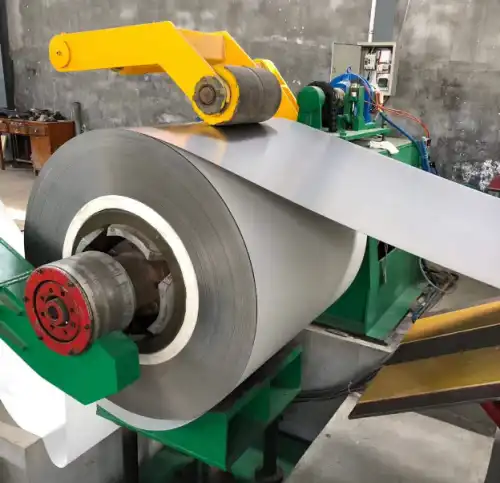The use of coatings plays a vital role in the stamping and forming of titanium sheets. Similar to other materials, titanium sheet stamping may require the application of coatings and lubricants to the surfaces of its blanks and preforms, as well as to certain critical areas of the tooling during forming. The main purpose of this step is to optimize the forming process, improve product quality, and extend tool life.
The primary purpose of using coatings in titanium sheet stamping and forming is to improve the surface quality of the part. Applying coatings can significantly reduce friction between the part and the tool can be significantly reduced, reducing the risk of scratches and resulting in a smoother, flatter part surface. This not only enhances the product's aesthetics but also its durability and functionality.

Secondly, coatings also serve to protect titanium parts from oxidation in titanium sheet press forming. Especially in the high-temperature forming process, the friction between the part and the mold will generate a large amount of heat, resulting in the surface of the part being prone to oxidation. The coating can effectively isolate the air, and reduce the parts and oxygen contact, thus avoiding or reducing the occurrence of oxidation, to maintain the original metal properties and color of titanium parts.
In addition, the use of coatings can also reduce the pressure required for molding. By reducing the friction between the part and the mold, coatings can make the forming process smoother, thus reducing the required forming pressure and increasing productivity.
At the same time, coatings also have the effect of extending the life of the mold. In the titanium sheet stamping and forming process, the mold will be subject to constant wear and impact. The coating can form a layer of protection to reduce the direct contact between the mold and the parts, thus reducing the degree of wear of the mold and extending its service life.
In addition, coatings can control the flow of material during deformation. By adjusting the type of coating and the method of application, precise control of the direction of material flow can be realized, thus ensuring the dimensional and shape accuracy of the molded part.
To meet these needs, coatings generally need to have a series of performance requirements. First, the coating should have good anti-corrosion properties, contain no harmful components, and will not contaminate the titanium sheet stamping material. Second, the coating should have a certain degree of adhesion, easy to apply on the surface of the parts and molds to form a uniform coating. Once again, the coating should have enough strength, not easy to be damaged in use, and can continue to play a lubricating and protective effect. In addition, the coating should have good lubricating properties, and can significantly reduce the coefficient of friction between the parts and molds. At the same time, the coating should be easy to remove, and will not leave residues on the surface of the part, so as not to affect the subsequent processing and use. In addition, the coating should be harmless to the operator's health and not cause occupational hazards. Finally, the cost of the coating should be relatively low to reduce production costs and improve economic efficiency.
Therefore, when titanium alloy plate manufacturers choose coatings for forming, they need to classify and select them according to the specific conditions of use. Generally speaking, coatings can be divided into two categories: coatings for room temperature forming (cold forming) and coatings for high temperature forming. Normal-temperature molding coatings are mainly used for titanium sheet parts that are stamped and formed at room temperature and require relatively high lubrication and adhesion properties. High-temperature forming coatings are mainly used for titanium sheet parts stamped and formed at high temperatures, with more stringent requirements for oxidation resistance and high-temperature resistance. By choosing the right coating, titanium alloy plate manufacturers can ensure that the titanium sheet stamping gets the best performance and quality in the forming process.





